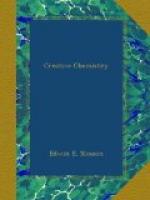As meat and dairy products become scarcer and dearer we shall become increasingly dependent upon the vegetable fats. We should therefore devise means of saving what we now throw away, raise as much as we can under our own flag, keep open avenues for our foreign supply and encourage our cooks to make use of the new products invented by our chemists.
CHAPTER XII
FIGHTING WITH FUMES
The Germans opened the war using projectiles seventeen inches in diameter. They closed it using projectiles one one-hundred millionth of an inch in diameter. And the latter were more effective than the former. As the dimensions were reduced from molar to molecular the battle became more intense. For when the Big Bertha had shot its bolt, that was the end of it. Whomever it hit was hurt, but after that the steel fragments of the shell lay on the ground harmless and inert. The men in the dugouts could hear the shells whistle overhead without alarm. But the poison gas could penetrate where the rifle ball could not. The malignant molecules seemed to search out their victims. They crept through the crevices of the subterranean shelters. They hunted for the pinholes in the face masks. They lay in wait for days in the trenches for the soldiers’ return as a cat watches at the hole of a mouse. The cannon ball could be seen and heard. The poison gas was invisible and inaudible, and sometimes even the chemical sense which nature has given man for his protection, the sense of smell, failed to give warning of the approach of the foe.
The smaller the matter that man can deal with the more he can get out of it. So long as man was dependent for power upon wind and water his working capacity was very limited. But as soon as he passed over the border line from physics into chemistry and learned how to use the molecule, his efficiency in work and warfare was multiplied manifold. The molecular bombardment of the piston by steam or the gases of combustion runs his engines and propels his cars. The first man who wanted to kill another from a safe distance threw the stone by his arm’s strength. David added to his arm the centrifugal force of a sling when he slew Goliath. The Romans improved on this by concentrating in a catapult the strength of a score of slaves and casting stone cannon balls to the top of the city wall. But finally man got closer to nature’s secret and discovered that by loosing a swarm of gaseous molecules he could throw his projectile seventy-five miles and then by the same force burst it into flying fragments. There is no smaller projectile than the atom unless our belligerent chemists can find a way of using the electron stream of the cathode ray. But this so far has figured only in the pages of our scientific romancers and has not yet appeared on the battlefield. If, however, man could tap the reservoir of sub-atomic energy he need do no more work and would make no more war, for unlimited powers of construction and destruction would be at his command. The forces of the infinitesimal are infinite.




